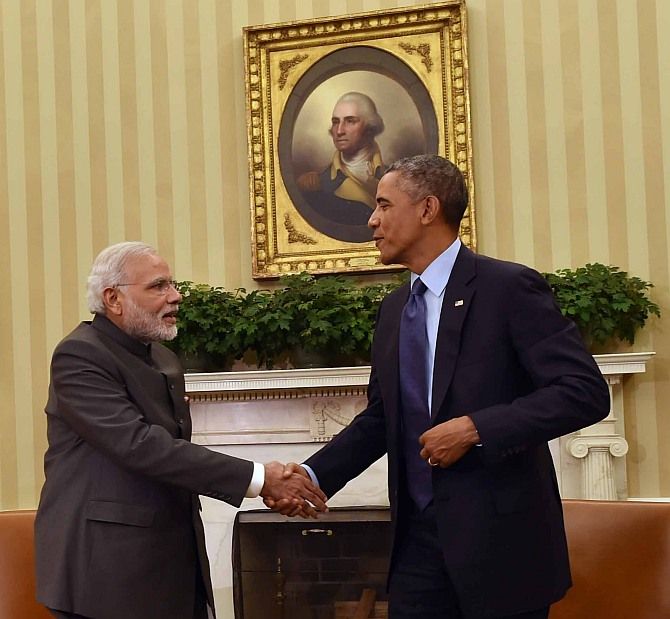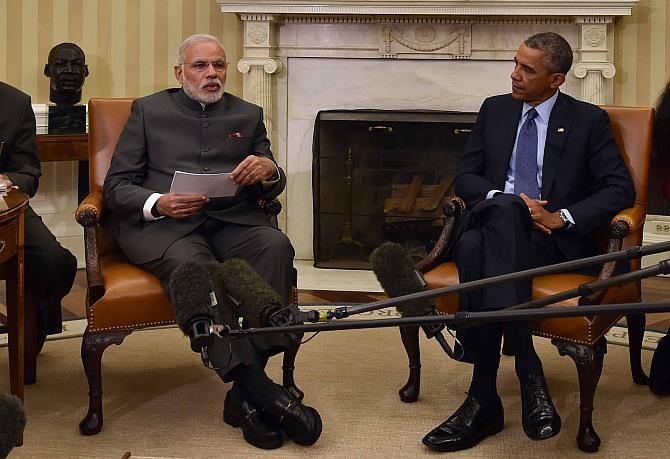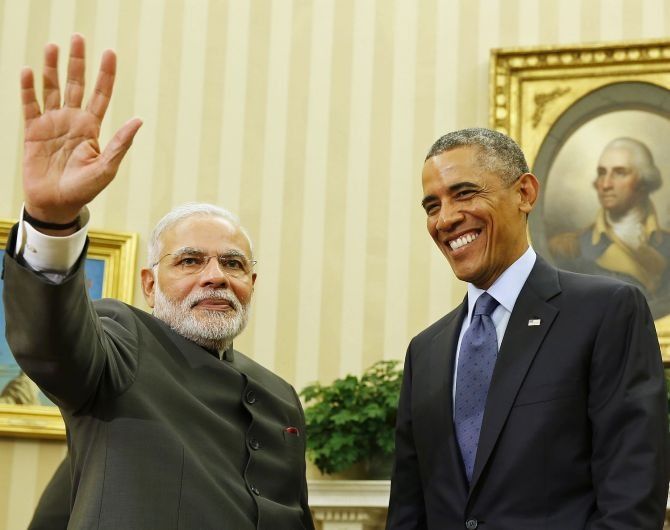In their first-ever summit meeting, Prime Minister Narendra Modi and United States President Barack Obama discussed a broad range of issues, including cooperation in defence, security, energy economy and space. Photographs by Paresh Gandhi / Rediff.com
Furthering Indo-US cooperation on terrorism, Prime Minister Narendra Modi and President Barack Obama on Tuesday agreed to make "joint and concerted efforts" to dismantle safe havens for terror and criminal networks like Lashkar-e-Tayib, Jaish-e-Mohammad, Dawood-company, Al Qaeda and the Haqqani network.
In their first summit meeting spread over two hours at the White House, the two leaders also agreed that the two countries will take steps to disrupt financial and tactical support to these terror outfits.
D-company is a reference to Dawood Ibrahim, the mastermind of the 1993 Mumbai blasts, who is believed to be in Pakistan. Indications were that India would seek US help in getting him extradited to face trial in India.
After the meeting between Modi and Obama, officials made it clear that India was not going to join "any coalition" in fight against terrorism in West Asia. Likewise, they clarified that a trilateral partnership agreed on Afghanistan, would be developmental in nature and not military cooperation.
They also said that the "joint and concerted efforts" on dismantling safe havens for terrorist groups and criminal networks do not mean that India and the US were going to launch operations but carry out any UN-mandated task.
Modi and Obama, whose discussions covered a broad range of issues including cooperation in defence, security, energy economic and space, took a significant decision to break the impasse on implementation of civil nuclear deal.
"We are serious about resolving issues on both sides in civil nuclear energy cooperation. This is important to India for meeting energy security needs," Modi said.
An inter-agency contact group will be set up to address the issues of liability, administrative and technical issues. From the Indian side, agencies like the Department of Atomic Energy, Ministry of External Affairs and finance ministry will be involved.
"We are setting up an inter-agency contact group to be able to resolve all issues that are outstanding and hindering the rapid deployment of US-origin nuclear reactors in India, that includes by liability, it includes administrative issues and it includes technical issues," Vikram Doraiswami, Joint Secretary (Americas), in the MEA, told reporters while briefing on the meeting between Modi and Obama. 
Doraiswamy said while India was not going to join any coalition against terrorism, the two sides had agreed on the need to deal with "travellers of terrorism" -- radicalised people who travel for participating in terror activities in West Asia.
"This is a very major issue for us," he said.
On Afghanistan, Modi and Obama discussed the political, security and economic transition which is underway. "We continue to be very supportive of the transition process in Afghanistan," the Indian official said.
Holding that India and the US are natural global partners, the two countries extended defence cooperation for another 10 years. Modi invited US companies to participate in defence manufacturing sector in India, which has recently raised the FDI cap from 26 to 49 per cent.
Expanding on the strategic partnership, Obama said India meets the standards of the Missile Technology Control Regime and is "now ready" for the membership of the elite Nuclear Suppliers Group, a 48-member body which controls global nuclear trade.
Obama also reaffirmed US support for India's membership of the expanded UN Security Council and backed it for "voice and vote" in international financial institutions like IMF and World Bank.
During the meeting, Modi asked Obama to take steps which would ensure easier access to Indian companies in services sector in the US markets.
Pledging to intensify cooperation in counter-terrorism and security, the two countries agreed to step up intelligence sharing.
The US will also cooperate as knowledge partner for India's planned National Defence University as well as technology partner in Indian Navy.
The US will also participate in expansion of India's infrastructure projects.
The US will also be the lead partner in developing Allahabad, Ajmer and Vishakapatnam as 'Smart Cities'.
The two countries will also cooperate in the Mars Mission.
In the economic area, the two countries discussed FDI and portfolio investment and participation in Indian manufacturing sector, in tune with Modi's 'Make in India' campaign.
They also agreed on cooperation between their central banks on regulation of their financial institutions and cross-border banking arrangements.
The US will also participate in India's endeavour in the renewable energy sectory with one billion dollars being pledged by the EXIM bank.
The two sides also agreed to set up Water and Sanitation Alliance. 
Modi and Obama pledged to push the bilateral relationship to "new levels".
At a joint media appearance with Obama, Modi expressed the hope that India-US relations will make fast progress.
"Both of us are committed taking forward the civil nuclear partnership agreement. We are serious about resolving at the earliest issues relating to civil nuclear energy cooperation. This is important for India for meeting energy security needs," he said.
The Indo-US nuclear deal concluded between the previous Manmohan Singh government and the Bush Administration has been stalled because of issues relating to liability laws.
Obama said India was emerging as a major power for peace and security in the region.
Both leaders also had a candid discussion about WTO issues.
"India supports trade facilitation but it is my wish that a solution should take care of our food security concerns. I am sure that it is possible to do that early," Modi said
"I am looking forward to building up on relationship and make more progress," he said.
Obama said that he and Modi discussed various issues, including trade and economic cooperation, cooperate in exploration of space and scientific developments especially to deal with challenges like Ebola.
Obama said he was impressed by Modi's pro-poor policies and efforts to revitalize the Indian economy.
"Throughout this conversation, I’ve been impressed with the prime minister’s interest in not only addressing the needs of the poorest of the poor in India and revitalizing the economy there but also its determination to make sure that India is serving as a major power that can help bring about peace and security for the entire world.
“So I want to wish him luck in what I’d sure will be a challenging but always interesting tenure as prime minister in India,” Obama said.
“I’m very grateful for the friendship between the United States and India, and I’m looking forward to building on this meeting so that we can continue to promote progress in both countries and around the world.
Obama said the two leaders have had an outstanding discussion around a range of issues.
“During our discussions, we reaffirmed that, as two of the world’s largest democracies, vibrant people-to-people contacts between India and the United States, including an incredible Indian-American population that contributes so much, that we have so much in common it is critical for us to continue to deepen and broaden the existing framework of partnership and friendship that already exists,” the President said.
After their Summit talks, Modi was hosted a lunch by Vice President Joe Biden in which Secretary of State John Kerry was present.
Addressing the luncheon, Modi said India is committed to fulfilling the hopes and aspirations that the world, especially the US, has with regard to the country.






 © 2025
© 2025